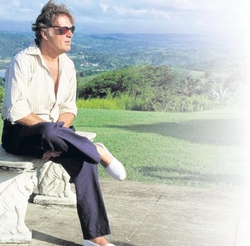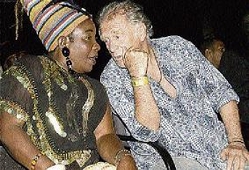Psoj hall of fame - Chris blackwell - The legend behind the legends
Published: Thursday | October 22, 2009

Chris Blackwell - File
London, circa 1967. England's capital is the world's hippest scene, thanks to mod fashions and amazing music from The Beatles, Rolling Stones and guitar sensation Jimi Hendrix.
One of the leading players in this cutting-edge mix was Chris Blackwell, president and founder of Island Records.
At the time, Island was one of the leading independent record companies, releasing music from an eclectic roster of acts including the Spencer Davis Group and Cat Stephens. Blackwell, however, had more than music on his mind.
"Whenever I made some cash, I would buy property in Jamaica to invest in. I always wanted to do that here," Blackwell told The Gleaner.
While he maintains some ties to the music business, Blackwell's primary interest is Island Outpost, a company which comprises some of the properties he purchased more than 40 years ago. These include Strawberry Hill in St Andrew and Goldeneye in Oracabessa, St Mary, the former haunt of James Bond creator Ian Fleming.
Blackwell, 72, was born in London to an Irish father who was a member of the Jamaica Regiment, and a Jamaican mother of Jewish origin.
He is best known for breaking reggae legend Bob Marley internationally through Island during the 1970s. Blackwell will be inducted into the Private Sector Organisation of Jamaica's Hall of Fame on Monday during a special function at the Hilton Kingston hotel, New Kingston, in recognition of his contribution to Jamaican commerce.
He was awarded the Order of Jamaica - the country's fourth highest honour - by the Government in 2004.
In August, Blackwell announced his latest project, a multimillion-dollar expansion of Goldeneye. The first phase is scheduled to be completed in late 2010 and will have 11 beachfront cottages.
He expects work on the new-look property to be finished in 2013.
Intimate surroundings

Rita Marley and Chris Blackwell at the Reggae Academy Awards, National Indoor Sports Centre, last year - FILE
Blackwell started Island Outpost in 1992. His Compass Point and Pink Sands properties in The Bahamas were bolstered by the acquisition of several small hotels in South Beach, Florida, plus Strawberry Hill and Goldeneye.
He has since sold his interests in The Bahamas and Florida. Today, Island Outpost's companies are purely Jamaican, with Jake's in Treasure Beach, St Elizabeth, The Caves in Negril, Westmoreland, and Geejam in San San, Portland, completing its slate of properties.
They all feature the intimate surroundings Blackwell grew up around in St Mary where his mother took him when he was only six months old.
It was as romantic as Ernest Hemingway's Havana or Errol Flynn's Port Antonio.
It is a setting he favours to this day.
"I've always wanted to develop a different type of tourism, where the buildings aren't so huge. I want it to be comfortable enough for people to enjoy the nature of the country," Blackwell explained.
Since the mid-1970s, mega all-inclusive hotels have replaced the quaint, verandah-type scene Blackwell came to love during the 1950s. He has never been a big fan of the all-inclusive concept but believes Jamaica's tourism has benefited significantly from it.
"Their marketing is incredible, you can go anywhere in the world and see Jamaica being advertised. If it wasn't for the all-inclusives, Jamaican tourism would have been in dire straits, but that's not what I'm trying to do," Blackwell stressed. "I feel, for Jamaica to reach its full potential, it needs smaller places. It's how any tourism industry is sustained."
To support this observation, he pointed to the thriving cottage industry in the United States and Europe.
"Once they (tourists) stay indoors, they don't get to know the country, and that does not benefit the towns," he said.
For 50 years, Chris Blackwell has promoted the Jamaican brand. It all started in 1959 when he formed Island Records while he was a water-ski instructor at the Half Moon hotel.
He recorded artistes like Wilfred 'Jackie' Edwards, Laurel Aitken and Owen Gray, all of whom had number one songs for the new label. Moving to London in 1962, Blackwell sold music by Caribbean artistes from the trunk of his car and was the leading distributor of sounds from that region in Britain.
He got a major break two years later when he released a ska song titled My Boy Lollipop by a Clarendon-born singer named Millie Small. It was an international sensation and changed Island's fortunes.
"It transformed us from a small company that distributed records to one that could make hit records. That song opened doors for us," Blackwell recalled.
By the 1960s, Island was releasing hit records by progressive rock acts like the Spencer Davis Group, which was led by a teen prodigy named Steve Winwood; folk singer Cat Stephens and groups like Free and Mott The Hoople.
Blackwell never lost his Jamaican flavour, however. He had promising singer Jimmy Cliff at Island but said for all his talent, it was difficult breaking him with a pop audience.
It was the early 1970s and Perry Henzell, a friend of Blackwell's in Jamaica, was working on a film based on the country's pop culture.
"He called and said he saw an album cover with Jimmy, and that he would be perfect for the starring role in the film, which was The Harder They Come," Blackwell remembered. "When Jimmy decided to leave, I was devastated, but a week after someone called and said Bob Marley and the Wailers were in town and if I wanted to see them."
Blackwell remembers the first time he met the Rastafarian group. "They looked like they walked straight out of The Harder They Come," he said.
Phenomenon

Chris Blackwell - File
While Marley's albums never matched the sales of the period's pop stars, his tours sold out and he became a phenomenon. His anti-Establishment message paved the way for similar acts out of Jamaica, including Burning Spear and Bunny Wailer, who also had outstanding albums released by Island.
Blackwell also signed a band named Third World, which recorded six solid albums for the label. Ibo Cooper was the group's keyboardist at the time, and credits Blackwell for allowing them to grow.
"We had no problems with him. Business-wise, he did us no wrong. He allowed us creative freedom," Cooper told The Gleaner in May.
After Marley's death from cancer in 1981, Blackwell continued to support Jamaican performers like Grace Jones and Black Uhuru but, in 1989, he sold Island to Polygram Records. He still has control over the label's lucrative catalogue, which is currently marketed and distributed by the Universal Music Group.
In May, Island Records celebrated its 50th anniversary with a series of events in London.
He steers clear of defining his legacy.
"I really don't get into that. I can say, looking back, there are many things I've done that I'm proud of," he said.







